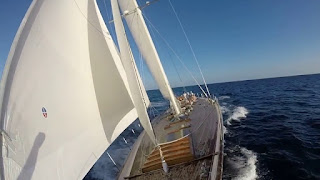The Party or the Podium

There is always a certain time of the year when yachtsmen from all over the world start to turn their thoughts toward some of the larger prestigious regattas’ and picture idyllic sailing and warm weather.
Around yacht club bars, if you listen into conversations you will hear the words “Hammo” and “Airlie” pop up frequently in conversation down here in Australia, in other locations the words “Key West” and “Cowes Weeks” tend to turn up in sailing discussions.
Thes types of events have become an integral part of the yacht racing calendar and no wonder. The water is warm, the drinks are cold and the racing is first class and all this usually with a backdrop that is truly spectacular.
These regattas have not only become premier events but are quite unique in the dual role they play; not only providing excellent world standard racing but a real catch up point for sailors from all over the world. It is one of the joys of these events to catch up with fellow yachties over a cold “frothy”, in fact these annual regattas are sometimes the only catch up point for many former sailing comrades. It is not unheard of to meet up with friends from relatively local clubs that you only wave to on the water for most of the year.
So we have an annual occurrence where we get to cross tacks on the race course with the finest company during the day and rub shoulders at the bar with them of an evening. So the big question is; how can we keep our crew focussed and committed on the racecourse whilst still enabling them to enjoy the delights the venues have to offer.
Set the rules
Communication and organistion are the keys; sort out well before the regatta starts what the expectations are and the main focus of the week. On a lot of the entries you will have a crew that are all chipping in and paying their own way and possibly helping out with the boat expenses. In this case it is important to speak to all the crew and get a handle on what they want to achieve and sort out the type of experience they are seeking. It would be foolhardy to have a combination of gung ho racers who turn up early checking weather, altering rig settings and breathing fire in anticipation coupled with lackadaisical Fred who might give it a miss today as he’s “a bit under the weather”.
Sometimes a middle ground approach can be the answer, “let’s go up there and give it our best shot for the first couple of days, if we are in the hunt we will keep going, if not lets just kick back and socially enjoy the latter part of the regatta”. Discuss the approach with your crew and with any partners that are attending well before you set off, it has to be set in black and white so all understand.
On the more competitive boats I think it is a great idea for the owner /skipper to send out a list of what he expects and what the crew responsibilities are.
For example
“I will supply boat, uniforms, accomodation, etc.
In return for this I expect respect, promptness, crew jobs completed etc
Whilst the crew will be personally responsible for their meals, drinks, airfares etc.
This approach leaves no one in doubt.
The Professional Approach
When a boatowner steps up and starts putting their hand in their pocket for the crews whether it is expense or wage, remember a professional program deserves a professional approach. They have the right for complete control and should expect nothing but absolute diligence and focus from their crew. No excuses for tardiness or irresponsible behaviour. Make this absolutely clear right from the outset.
Start planning early.
So regardless of your intentions set up a group email list and start getting it all together, set the ground rules and expectations. If you are serious about the racing, during the regatta meet each day prior to go over course and prospects for the day. It could be on the boat or at a preordained breakfast spot; it is far better than wandering onboard in dribs and drabs.
Food is always a big issue, do you want to supply your own each day or do you cater? Everybody has different criteria and tastes, some people will exist for the week on bacon and eggs rolls and hamburgers, others prefer fruit, sundried tomatoes and tofu on multigrain (usually ex laser sailors). I am certain that some members of the foredeck eat only raw meat. Whatever the case find out and get it sorted so every one is happy, on the boats with larger crews there can be a very broad demographic. Delegate someone, not necessarily a crew member, a partner or friend can help and be involved by helping with the catering, let them know what is required.
Make sure everyone has an area of responsibility; some of these regattas do not have services on hand. If you have a creaking winch, a small nick in the spinnaker or something that needs attending to, then someone needs to be responsible and get it fixed or serviced before the next race. Sort out these delagative areas and as a crew let the skipper know if you have any relative areas of expertise that will help.
Nip trouble in the bud
After the days racing have a debriefing, go over what went wrong and talk through it, work out any jobs that need doing and delegate them. When it has not been a good day, sort it out before you get off the boat. Remember at a regatta you can’t go home and kick the cat, that person you had a problem with is likely to be at the bar beside you laughing and enjoying them selves that night. So sort out any problems whilst still on the boat and leave them there, don’t air your dirty linen in public, nothing sets crew and boat morale in a downward spiral quicker.
Even when the main focus is the racing, it is still possible to have a good time; use the laydays to let the crew off the leash a bit, which is why they have them. There is nothing wrong with a couple of quiet beers after the race and more than a few on layday eve.
With all this partying and sailing, it can be a hell of a lot of fun. Where else would you want to be?
Just make sure you pre-empt any potential problems by making sure all the crew know why you are all there and what you can all expect from each other.
Unfortunately there are occasions where there is one person who just does not or won’t try to fit in, take them aside and make a decision for the greater good, you don’t want one person to ruin your whole week. If they won’t conform then let them go, it will blow up in your face otherwise; a week is a long time to put up with someone disruptive.
Another unique facet of these regattas is the crews can quite often be a mishmash of several different crew all being put together. Sometimes you can have crew you have never met before, get in touch with all and discuss their regular positions, sort out the crew positions with the information you have gleaned and let every one know. This is all you can do, you will often find someone has overrated themselves or more rarely has under stated their abilities. If it doesn’t workout change them around. Just make sure everyone knows it is a team sport and all are contributing, whether it be packing spinnakers or steering.
Sailing is fun.
We go sailing for fun, so all work hard on crew morale; it makes a huge difference to the week. Take the edge off the day to day racing dramas by having awards, the most common would be the baby’s dummy to the biggest dummyspit of the day or the blonde award to the stupidest comment.
Make sure you take time to enjoy the moment; I can recall a couple of years ago at Hamilton Island Race Week whilst halfway through a race and being quite frustrated at our poor position. I saw a sunlit Pentecost Island come into view to leeward out the back of the mainsail and thinking “still beats the hell out of working”.
Tony Bull



Comments
Post a Comment